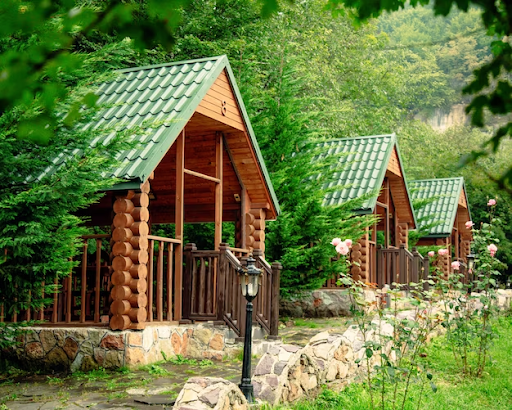Tiny Houses: The Ultimate Guide to Downsizing and Simplifying Your Life

In a world where bigger has often been associated with better, the growing popularity of houses has sparked a shift towards embracing minimalism.
“Tiny Houses; A Comprehensive Guide to Simplifying and Streamlining Your Life” explores the potential of house living delving into the principles of downsizing, decluttering and embracing minimalism in order to achieve enhanced freedom, flexibility and fulfillment.
Adaptability and Mobility
One of the advantages of houses lies in their adaptability. Many owners choose to construct their homes on wheels enabling them to relocate as circumstances dictate.
This flexibility is particularly appealing for nomads retirees seeking experiences or those with an inherent sense of adventure.
Whether it involves traversing regions or simply moving within a neighborhood, individuals residing in houses relish the freedom that comes with exploring new places while preserving the comfort of home.
Personalization and Ingenuity
Despite their dimensions tiny houses offer opportunities for personalization and ingenuity.Each tiny house is a reflection of its owners personality and preferences showcasing designs and innovative interior layouts.
Building their homes is a thrilling experience for DIY enthusiasts as they get to incorporate personalized touches and come up with solutions.
This hands-on approach fosters a deeper connection to space. Fills homeowners with a sense of pride.
Sustainable Living Practices
Tiny houses promote living practices in ways. Due to their size they require materials to build, resulting in less waste and a reduced environmental impact.
Moreover many tiny house owners embrace off grid living by relying on energy sources like power and rainwater harvesting.
They also make use of composting toilets, greywater systems and natural building materials to minimize their footprint. By treading on the land tiny house dwellers demonstrate their commitment to stewardship and sustainable living.
Community Building
Contrary to belief that tiny house living entails solitude and isolation many enthusiasts actively build communities around this lifestyle. Tiny house festivals, workshops and online forums provide opportunities for minded individuals to connect with one another, share ideas and offer support.
Co-housing arrangements and intentional communities foster a sense of belonging and cooperation, among residents who can share resources while still maintaining their independence.
Economic Considerations
Apart from the cost savings residing in houses brings long term financial advantages to homeowners. Lower utility bills, decreased maintenance expenses.
Simplified lifestyles contribute to enhanced security and freedom. Many individuals living in houses are able to live without debt or significantly reduce their expenses enabling them to pursue their passions, travel or save for the future.
Cultural Impact
The tiny house movement has also made an impact by challenging prevailing attitudes towards homeownership and consumerism.
Through media coverage documentaries and social media presence tiny houses have captivated imagination. Sparked discussions about alternative lifestyles and values.
They serve as symbols of simplicity, self-reliance and creativity that inspire others to question norms and explore paths towards happiness and fulfillment.
Mental Health Benefits
Residing in a house can have effects on mental well being. The uncluttered environment promotes mindfulness while reducing stress by eliminating the distractions typically associated with homes.
With fewer possessions to manage people often find themselves experiencing a sense of calm and clarity.
The smaller living space encourages interactions and helps foster stronger connections, with family members and neighbors contributing to a sense of community and belonging.
Urban Density and Affordable Housing
In populated areas tiny houses can provide a potential solution to the ongoing affordable housing crisis.
By utilizing parcels of land efficiently cities can accommodate more residents without relying on large scale development projects.
Tiny house communities and infill housing initiatives offer options for low income individuals and families helping address the issues of homelessness and housing inequality.
Aging in Place
For seniors who wish to age in place tiny houses present an alternative to retirement communities or assisted living facilities. These compact homes can be designed with design principles in mind incorporating features like single floor layouts, wide doorways and accessible bathrooms.
With the ability to customize their living spaces according to their needs older adults can maintain their independence while staying connected to their communities.
Educational Opportunities
The rise of the house movement has also sparked interest, in forms of education and hands-on learning experiences.
Tiny house workshops and educational programs provide hands on learning opportunities for individuals to gain knowledge, about design, construction methods and off grid living practices.
Advocacy and Policy Change
As the tiny house movement continues to grow in popularity advocates are actively working towards modifying zoning regulations and building codes to accommodate dwellings.
Grassroots organizations and lobbying efforts are pushing for reforms that would legalize houses, establish communities dedicated to tiny living and enable the creation of accessory dwelling units (ADUs) in urban areas.
Resilience and Adaptability
houses offer a level of resilience and adaptability that proves invaluable in an unpredictable world. Their compact size and portability make them ideal for disaster response initiatives as emergency housing solutions.
In times of disasters such as hurricanes, wildfires or floods tiny houses can serve as shelter, for displaced individuals or families who have lost their homes.
Furthermore their ability to function off the grid makes them perfect, for inaccessible areas where traditional infrastructure may be insufficient.
Conclusion
The emergence of small scale living is transforming our approach to housing, education, community development and urban planning. By prioritizing simplicity, sustainability and human connection individuals who choose to live in houses are establishing a model for a resilient, fairer and more harmonious society.


